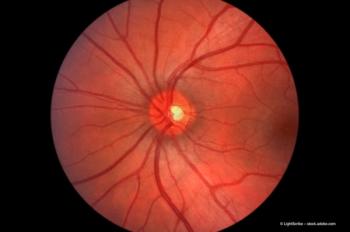
Phase 3 study assesses superiority in mean BCVA in OPT-302 combination therapy over anti-VEGF-A monotherapy
Dr David Boyer discusses the Phase 3 investigation for OPT-302 combination therapy for wet AMD.
In Fort Lauderdale, Florida, United States, Dr David Boyer presented a talk entitled, “OPT-302 Combination Therapy in wet AMD: Phase 3 program designed to assess superiority in mean BCVA over anti-VEGF-A monotherapy.” Dr Boyer serves as a retina specialist at Retina-Vitreous Associates Medical Group as well as a leading investigator for various national clinical trials.
Video transcript
Yeah, it's my pleasure to present to you some data concerning a drug that actually will improve our present treatment of patients with wet macular degeneration.
When the anti-VEGF era began, we were told that the VEGF receptor 1 and 2 were the most important and VEGF receptor 3 and 4 were not. And everything was concentrated basically on VEGF-A, and then aflibercept came out, so VEGF-B became important. We were always told that VEGF-C and -D were unimportant, and they were probably related to lymphomagenesis.
Well, it turns out that that's not quite true, because when you administer the anti-VEGF to block VEGF-A, you also get an upregulation of VEGF-C and -D. And we find that when patients that have wet macular degeneration, they have an elevated level of VEGF-C in their plasma. There's a lot of evidence now that the VEGF-C and -D receptor via G3, it plays an important role and is able to promote leakage. So blocking VEGF-C and -D is a great place to improve the quality of the patient's vision and the anatomic outcomes.
There were several studies that were done in Phase 1-2A and a Phase 2B study and then a very large Phase 2B study with about 366 patients. The comparator was ranibizumab, and it was divided 1 to 1 to 1. And basically, the patients received ranibizumab every month for six months, ranibizumab every month plus OPT-302 0.5 milligrams or OPT-302 2.0 milligrams.
The study was very interesting. At the end of the study the high dose the two-milligram dose showed about a 3.4 letter improvement overall. And it was not only an improvement in the in the vision: There was a tendency for an improvement in the 5, 10, 15 Letter gainers, as well as a decrease in the patients who had loss of 5, 10, or 15 letters. And anatomically, there was also significant improvements in the retinal thickness, in subretinal fluid and intraretinal fluid.
There was a pre-specified analysis that was performed and basically this eliminated the RAP [retinal angiomatous proliferation] lesions. And that was still allowed 70% of the patients in the trial to be evaluated. When you evaluated those patients and eliminate the RAP lesions, you had a 5.7 letter improvement, you had a marked improvement both in the 5, 10, 15 letter gainers, the number of patients who received 20/40 vision, and all the anatomic endpoints that we look for—the reduction of subretinal fluid, intraretinal fluid, and retinal thickness.
Based upon this the study will continue into a Phase 3 trial, and you have basically 2 groups of patients: The one group of patients will continue to receive ranibizumab as given by label every month, plus 0.5 milligrams of OPT-302, or two milligrams of OPT-302. The other group will receive aflibercept according to label receiving monthly injections for 12 weeks, and then every eight weeks after that.
And again, the additional treatment is with 0.5 milligrams of OPT-302 or two milligrams of OPT-302 against the aflibercept alone group.
Based upon the results in the Phase 2, patients with RAP lesions were eliminated. And we're very hopeful that we will see the similar results of getting 5.7 letters in this subgroup.
The study is ongoing right now and is still enrolling and if you have patients that you feel would benefit from this, certainly contact the nearest investigator.
Note: This transcript has been lightly edited for clarity.
Newsletter
Get the essential updates shaping the future of pharma manufacturing and compliance—subscribe today to Pharmaceutical Technology and never miss a breakthrough.




























